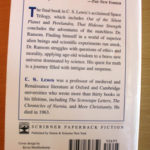‘A Willingness To Be Enchanted’
Christmas is coming, and according to some media purveyors, this year’s “holiday wars” version is different. Apparently more people have simply had it with these sorts of things:
- PETA (insert sarcastic yet clichéd alternate acronyms) says not to pardon the turkey.
- “One Poll Says 45% Would Rather Skip Christmas” is the headline of this CNBC article.
- “It’s time to ban Christmas presents,” one columnist says. To be fair, that headline is worse than his actual suggestion, which is better phrased in the actual piece: “This isn’t about stopping festive fun, it’s a challenge to pressured, blithe and habitual gift-giving.”
 Who would object to that last, anyway? I would only say the columnist has no Truth basis to object to materialism, children’s greed, and going into debt to “give.” After all, certain U.S. government leaders are having a fine and dandy time endorsing all three societal ills. Why not bring this to the individual level? What objective morality opposes materialism?
Who would object to that last, anyway? I would only say the columnist has no Truth basis to object to materialism, children’s greed, and going into debt to “give.” After all, certain U.S. government leaders are having a fine and dandy time endorsing all three societal ills. Why not bring this to the individual level? What objective morality opposes materialism?
The Christian answers: Christ’s morality. If Christ matters more than material things, if all was created by Him and for Him (Col. 1: 15-20), then He decides how things must be used.
Otherwise, all we possess is created things. Temporary pleasures. Materialism.
But clearly people are finding out that doesn’t bring lasting happiness at holiday-time. So what’s their solution? Address the heart problem? Root out the source of materialism — idolatry? Replace that false glorification of Things with true glorification of their Creator?
Of course not. That would be inhuman. Instead, lurch into secular legalism. Wrap up “re-gifted” rules against gifts. Replace materialism with moralism. Idolize not celebrating over celebrating. And while you’re at it, swing wild from potential gluttony or even real animal cruelty (say, to turkeys) to worshiping creation itself and even birds (Rom. 1: 22-23) rather than the Creator (Rom. 1:25) and rejecting God’s permission to enjoy meat (Gen. 9).
All along, your motive for living becomes a great big don’t, an anti. Don’t hurt poor animals. Don’t be greedy. Don’t spend too much on holidays. Better: don’t celebrate at all.
These may be the same people who detest legalistic churches.

Ah, the freedom of duck-diving into a massive money bin, and snapping your own neck.
Ha! We don’t need clichéd hellfire-themed pulpit-pounding to make “religious” constraints. We invent those using our own “secular” imaginations. In all false religions (including those beliefs disguised as “secular politics”), man calls freedom “slavery,” and slavery “freedom.”
This includes enslavement to distraction, an oft-discussed plague in the age of iEverything.
Kids text more than they talk. Dinners are interrupted by buzzing iDevices. People surf the internet while watching their TV and listening to music and ranting about overstimulation.
Often such idolatrous cravings for constant self-distraction are at the root of materialism.
It won’t work to say “do one thing at a time,” or “stop becoming a digital zombie and be a part of your community.” It also won’t work simply to demand we purge our materialism. At best that creates a vacuum. What can replace materialistic distraction? Without God, only more laws and legalisms. Merely different distractions. Going from bad to worse.
Only the true Hero, Christ, of the true Story of reality, His Word, can change this.
Only Christ can replace fake-freedom legalism with true freedom.
And only Christ can purge forced-disillusionment for Himself-exalting enchantment.
Behold His wonders
Have you seen the face of wonder? Such imagery appears in many Christmas songs, often as a sort of golden-age-of-Christmases-past remembrance. The eyes of a child; the thrill of our own childhood holidays, visiting family, foods, gifts, and music; always some previous age.
Here I speak not to those who’ve experienced real hurt or pain, particularly during holiday seasons. Rather, I am thinking of the willful Distracterati. This faction may include “adults” who want to be disillusioned, hip, and trendy-victim-esque. Who prefer songs about angsty breakups to songs about true love. So cool are they. Cool fools, really.
I demand: why so forcefully disillusioned?
Who said wonder and enchantment should only be for children?
 It wasn’t C.S. Lewis who created this concept, yet according to biographer Alan Jacobs in The Narnian (I found the quote here), Lewis’s life was transformed by this truth.
It wasn’t C.S. Lewis who created this concept, yet according to biographer Alan Jacobs in The Narnian (I found the quote here), Lewis’s life was transformed by this truth.
Lewis’s mind was above all characterized by a willingness to be enchanted and […] it was this openness to enchantment that held together the various strands of his life—his delight in laughter, his willingness to accept a world made by a good and loving God, and (in some ways above all) his willingness to submit to the charms of a wonderful story, whether written by an Italian poet of the sixteenth century, by Beatrix Potter, or by himself.
“What is ‘secretly present in what he said about anything’ is an openness to delight, to the sense that there’s more to the world than meets the jaundiced eye, to the possibility that anything could happen to someone who is ready to meet that anything.”
Openness to enchantment. Willingness to accept a world made by a good and loving God (while also, I would add, accepting the reality of sin). And (gasp) a willingness to submit.
Behold the real reason behind forced-disillusionment, “coolness,” and even materialism.
By nature, we don’t want to submit. Not to enchantment. And definitely not to God.
Without our Creator/Savior, every “joy” is either an imposter or at best fleeting.
In gift-giving, holiday feasts, epic stories or anything else, we can get hints of God-glorifying enchantment. Yet they all point to and find their fulfillment in Him, the only Giver of every good gift (James 1:17), “who richly provides us with everything to enjoy” (1 Tim. 6:17).
Yet this is not mere gratitude for material gifts. I have wondered if Thanksgiving should follow rather than precede Christmas. God’s greatest gift for which we should be thankful is His Son, His life of righteousness, sacrificial death for sinners, resurrection that guarantees our present spiritual resurrection and future bodily resurrection, and His coming Kingdom.
Only through that Epic Story of His redemption can all holidays, gifts, and fantastic stories be redeemed to enchant His people.










































Ooh, good article, Stephen! I love that quote about Lewis’s willingness to be enchanted. I’ve been thinking of how to make the holidays wonderful for my kids. We always did Advent, with the candles and Bible reading. We had a little felt Christmas tree with advent ornaments and we’d hang one every night.
For me, as a kid, anticipation of Jesus’s birth was all mixed up with anticipation of christmas. When it came, it was satisfying on a material and transcendent level.
This is an insightful post on multiple levels. The price of all our rampant worldly materialism and fulfilling of the selfish Flesh for so long in our holiday celebrations is the loss of the enchantment. Also, it is perfectly natural that the secularist worldview would ultimately disparage holiday celebrations. By definition, secular humanism can have no holy days.
That’s a keen, Lewisian observation if ever there was one. I think this has more relevance to the greater issue, but I just can’t make the connection right now.
The relationship between distraction and sin is unclear to me. I want to see the connection better. I am sure that a connection is there; distraction is not an ideal state. How does this relate the holidays? Because our materialistic toys have blinded us to the True Meaning — or perhaps, even more importantly, to the true spiritual essence or enchantment — of the holidays?
We don’t need the latest toys to be distracted or disillusioned. I will make an embarrassing confession — I’ve never owned a cell phone of any kind, not a smartphone, not a simple flip phone, nothing, ever. And yet, I think I must struggle against both distraction and disillusionment as much as anyone. I personally can’t imagine how I could be any more distracted. I can hardly get anything done. And I’m certainly often disillusioned and depressed. I don’t think smartphones or social media inherently do anything to increase distraction at all, and I don’t see how smartphones or Facebook have anything directly to do with holiday disillusionment/materialism.
Bainespal, I would agree that it isn’t the stuff–the smart phones or tablets or whatnot that is the cause of distraction. I think the overuse or misuse of those things is the result of distraction. I think there is a growing number of people who don’t want to be alone with their thoughts.
Of course this is conjecture on my part, but it seems harder to believe in “man is good” and “I’m OK” when we actually have time to face ourselves. In a similar way, being with others points out the true nature of those relationships. Are they built on love or need fulfillment? It’s so much easier to hide away in 140 character bites or demand of the moment texts.
Definitely a thought-provoking article, Stephen. Thank you.
Becky
Agreed; it’s not the things, but the abuse of things, that causes the sin. (See also: holidays, Harry Potter, and pretty much everything we discuss on Spec-Faith.)
From Becky:
… Which could lead to dangerous thoughts, put there by the Holy Spirit to encourage more thinking about things, not merely distraction. I doubt it was Screwtape (from The Screwtape Letters) who invented the devilish technique of distraction to avoid ghastly things like God-honoring intelligence and argument.
Perhaps a better evidence comes from our own lives. If I’m materialistic or self-distracted, that’s my fault, not my laptop computer’s. This computer can be used for good or evil. In fact, just today I realized that I will eventually need a new long-life battery ($200, hurrah) to keep the thing running without needing to plug it in, in awkward locations. Should I get this or shouldn’t I? I can make do even in work-related situations, so I’ll delay as long as I can. But if my motives are materialistic, I should likely delay. (The same is true of that flatscreen television …)
In my life, this is also why I’ve avoided iEverythings. For me, they would be too enabling of any materialistic and self-distracting impulses. They’re also too expensive, and I don’t need to be around the internet all the time. 🙂
Ironically, I’ve previously suggested on Spec-Faith that nothing would preclude, say, an iPhone-like device being used on the New Heavens and New Earth. Making or even desiring such devices is not inherently sinful; in fact, making one aligns better with God’s creation mandate in Gen. 1 – 2. But sin twists everything. And we can be assured that with or without iThings, the New Earth will be free of all sinful abuses.